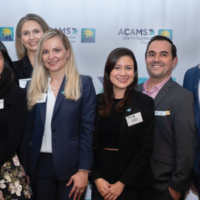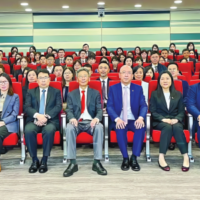
In 2021, the ACAMS Germany Chapter hosted five online events covering a range of emerging topics, such as environmental, social and governance (ESG) and decentralised finance (DeFi). In addition, it covered developments in some of the most crucial areas of anti-financial crime (AFC), such as sanctions and transaction monitoring. Interestingly, we found that the vibrant fintech community in Germany’s capital city, Berlin, has become international in many areas including AFC. We realised that it is sometimes better to host the events in English in order to reach all of the professionals who are interested in engaging with our chapter and benefiting from the knowledge shared at our events. The following summarises the details of the events and key points of the discussions.
Fintech and AFC
Following the Wirecard scandal, the German regulator BaFin has increased its scrutiny of the fintech sector. The event brought together several Berlin-based financial crime experts to share their approaches to building AFC programs within their respective fintechs. These experts discussed the form and shape that BaFin’s refocus has taken and how it has impacted their anti-money laundering (AML) programs. In addition, the panellists addressed the present challenges attached to the regulatory framework, as well as new trends and best practices for implementing AFC programs. One of the main topics during the event was typologies and red flags associated with emerging crime trends linked to COVID-19. The panellists were optimistic that an AML regulation that standardises customer due diligence requirements across the EU would support more effective AML/combatting the financing of terrorism (CFT) programs. The panellists were also encouraged by the development of public-private partnerships and the opportunity to become involved in the process of framing the EU AML framework.
ESG and AFC
The EU Criminal Law Directive, which was implemented in Germany in late 2020, has increased the number of predicate crimes and now includes environmental and social issues, such as human rights. With the launch of the EU’s Green Deal and the importance of mitigating the threat posed by climate change, the role of the AFC professional is evolving and now includes preventing ESG crimes from destabilising the financial sector. Given the so-called “all-crimes-approach” adopted by the EU, our presenters looked at how ESG requirements have started to impact the AML regulatory framework and the importance of understanding country risk assessments and specific red flags within that context.
DeFi and AFC
The chapter held several events on emerging technologies, including virtual currencies. The events focused on the topic of DeFi and provided an overview of regulatory developments and ongoing discussions at the national and international levels. The panellists discussed the financial crime risks posed by DeFi and presented some typologies and red flags linked to these emerging business models. The challenges of regulating DeFi through traditional AML/CFT controls, given that the technologies and stakeholders are intrinsically borderless and global, were also discussed. Furthermore, the events included the typologies and red flags that are emerging as tools necessary to mitigate the risks linked to DeFi.
Economic Sanctions and Trade Compliance Trends and Challenges
Economic sanctions are a regular topic in the chapter due to the ever-changing sanctions landscape, evolving regulatory framework and typologies of sanctions evasion. Various typologies linked to individual sectors, emerging sanctions cases and trade compliance were areas of focus. The event also provided best practices for meeting regulatory requirements in the area of sanctions and trade compliance, as well as some recommendations on how to prepare for a supervisory audit.
AML, AI and Cloud Technology
In recent years, AML technology has evolved, and a wide range of solution providers have developed new technology solutions. These include machine learning and artificial intelligence (AI) to help solve the problems that emerge from financial crime. Transaction monitoring is one of the key areas where significant problems remain, despite the use of technology. The event discussed how the innovative use of AI might be able to add value to support compliance teams in reducing false positives efficiently and effectively.
A big thanks goes out to our sponsors: Finleap Connect, Countryrisk.io, Berlin Risk, FTI Consulting and HAWK:AI and to our media partner, the Compliance Channel. Also, to our speakers listed below.
• Natalia Kisiel, group legal and AML officer, Finleap Connect
• Thomas Ball, group money laundering reporting officer (MLRO) and head of AFC governance and advisory, N26
• Toni Azapovic, head of AML and MLRO, Holvi
• Aiga Senftleben, co-founder and general counsel, Billie
• Isabel Ferreira Gomes, senior compliance office and MLRO Germany, IBANFIRST SA
• Michael Zammert, chief compliance officer Germany, Blackrock
• Bernhard Obenhuber, managing partner, CountryRisk.io
• Nina Siedler, partner, DWF
• Ari Redbord, head of Legal and Government Affairs, TRM Labs
• Nathan Williams, founder and CEO, Minespider
• Cornelia Tomczak, head of Policy/Governance Sanctions and Embargoes, Deutsche Bank
• Aneta Klosek, director, LexisNexis Accuity
• Naidira Alemova, partner, FTI
• Lars-Heiko Kruse, partner, PWC
• Falk Schubert, senior vice president, HAWK:AI
• Thomas Seidel, senior compliance manager, HAWK:AI
For additional information on the ACAMS Germany Chapter, membership details, upcoming events and an overview of activities since 2016, please visit the chapter’s page: http://www.acams.org/acams-chapters/germany.
To reach the chapter directly, email germanychapter@acams.org.
Jennifer Hanley-Giersch, CAMS-Audit, managing partner, Berlin Risk Advisors GmbH, Berlin, Germany, jennifer.hanley@berlinrisk.com










